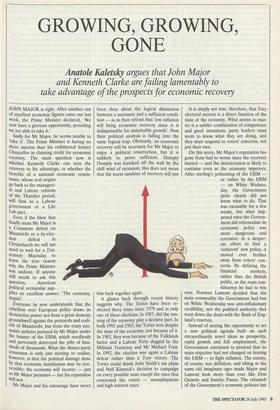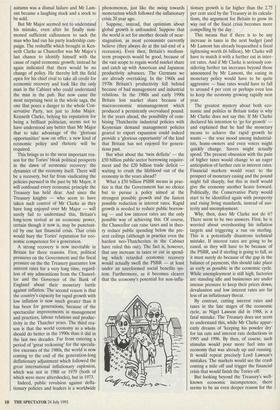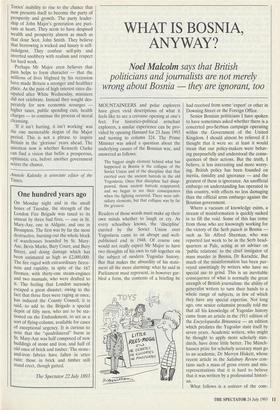GROWING, GROWING, GONE
Anatole Kaletsky argues that John Major
and Kenneth Clarke are failing lamentably to take advantage of the prospects for economic recovery
JOHN MAJOR is right. After another run of excellent economic figures came out last week, the Prime Minister declared, 'We now have a glorious opportunity, providing we are able to take it.'
Sadly for Mr Major, he seems unable to `take it'. The Prime Minister is having no more success than his embittered former Chancellor in claiming credit for economic recovery. The main question now is whether Kenneth Clarke can turn the recovery to his advantage, or whether the benefits of a national economic renais- sance, whose real origins go back to the manageri- al and Labour reforms of the Thatcher period, will flow to a Labour government or a Lib/ Lab pact.
Even if the blow that finally stuns Mr Major is a Commons defeat on Maastricht or a by-elec- tion defeat in Christchurch we will not need to wait for a 21st- century Macaulay to learn the true reason why the Prime Minister was undone. If anyone still needs to ask this question, American political vernacular sup- plies an excellent answer: 'The economy, stupid.'
Everyone by now understands that the rebellion over European policy draws its destructive power not from a great demotic groundswell against the protocols and codi- cils of Maastricht, but from the crazy eco- nomic policies pursued by Mr Major under the banner of the ERM, which needlessly and perversely destroyed the jobs of hun- dreds of thousands. What the dinner-party consensus is only just starting to realise, however, is that the political damage done by that economic humiliation may be irre- versible: the economy will recover — just as Mr Major promises — but his reputation will not.
Mr Major and his entourage have never been clear about the logical distinction between a necessary and a sufficient condi- tion — as in their refrain that 'low inflation will bring economic recovery since it is indispensable for sustainable growth'. Now their political analysis is falling into the same logical trap. Obviously, an economic recovery will be necessary for Mr Major to enjoy a political resurrection, but it is unlikely to prove sufficient. Humpty Dumpty was knocked off the wall by the chill wind of recession; this does not mean that the warm sunshine of recovery will put him back together again. A glance back through recent history suggests why. The Tories have been re- elected three times since 1979 and in only one of these elections, in 1987, did the run- ning of the economy play a decisive part. In both 1992 and 1983, the Tories won despite the state of the economy, not because of it. In 1983, they won because of the Falklands factor and a Labour Party dogged by the Militant Tendency and Mr Michael Foot. In 1992, the election was again a Labour defeat rather than a Tory victory. The Tories could thank John Smith's tax plans and Neil Kinnock's decision to campaign on every possible issue except the ones that concerned the voters — unemployment and high interest rates. It is simply not true, therefore, that Tory electoral success is a direct function of the state of the economy. What seems to mat- ter is a subtler combination of competence and good intentions: party leaders must seem to know what they are doing, and they must respond to voters' concerns, not just their own.
financial markets, rather than the British public, as the main con- stituency he had to win over, Norman Lamont decided that the main commodity the Government had lost on White Wednesday was anti-inflationary credibility, not the political authority that went down the drain with the Bank of Eng- land's reserves.
Instead of seizing the opportunity to set a new political agenda built on such extraordinarily novel ideas as prosperity, rapid growth and full employment, the Government continued to pretend that its main objective had not changed on leaving the ERM — to fight inflation. The enemy, of course, was deflation, and tilting at the same old imaginary ogre made Major and Lamont look more than ever like Don Quixote and Sancho Panza. The relaunch of the Government's economic policies last autumn was a dismal failure and Mr Lam- ont became a laughing stock and a stock to be sold.
But Mr Major seemed not to understand his mistake, even after he finally sum- moned sufficient callousness to sack the man who had run his party leadership cam- paign. The reshuffle which brought in Ken- neth Clarke as Chancellor was Mr Major's last chance to identify himself with the cause of rapid economic growth; instead he again indicated that there would be no change of policy. He thereby left the field open for his chief rival to take all credit for economic recovery and look like the only man in the Cabinet who could understand the man in the pub. Bur now came the most surprising twist in the whole saga, the one that poses a danger to the whole Con- servative Party, not just to John Major. Kenneth Clarke, belying his reputation for being a brilliant politician, seems not to have understood any better than Mr Major that to take advantage of the 'glorious opportunities' now on offer, a new kind of economic policy and rhetoric will be required.
This brings us to the most important rea- son for the Tories' bleak political prospects in the dawn of economic recovery: the dynamics of the economy itself. There will be a recovery, but far from vindicating the policies pursued in the past by Mr Major, it will confound every economic principle the Treasury has held dear. And since the Treasury knights — who seem to have taken such control of Mr Clarke as they have long enjoyed over Mr Major — will surely fail to understand this, Britain's long-term revival as an economic power, certain though it now is, may be punctuat- ed by one last financial crisis. That crisis would bury the Tories' reputation for eco- nomic competence for a generation.
A strong recovery is now inevitable in Britain for three reasons. First, political pressures on the Government and the fiscal pressure on the the Treasury guarantee low interest rates for a very long time, regard- less of any admonitions from the Chancel- lor and the Governor of the Bank of England about their monetary battle against inflation. The second reason is that the country's capacity for rapid growth with low inflation is now much greater than it has been for generations, because of the spectacular improvements in management and practices, labour relations and produc- tivity in the Thatcher years. The third rea- son is that the world economy as a whole should do better in the 1990s than it did in the last two decades. Far from entering a period of 'great reckoning' for the specula- tive excesses of the 1980s, the world is now coming to the end of the generation-long deflationary adjustment which followed the great international inflationary explosion, which was not in 1988 or 1979 (both of which were mere aftershocks), but in 1973.
Indeed, public revulsion against defla- tionary policies and leaders is a worldwide phenomenon, just like the swing towards monetarism which followed the inflationary crisis 20 year ago.
Suppose, instead, that optimism about global growth is unfounded. Suppose that the world is set for another decade of near- stagnation, as most economists currently believe (they always do at the tail-end of a recession). Even then, Britain's medium- term prospects would be good, because of the vast scope to regain world market share and catch up with American and Japanese productivity advances. The Germans we are already overtaking. In the 1960s and 1970s Britain's productivity fell behind because of bad management and industrial relations. In the 1980s and early 1990s Britain lost market share because of macroeconomic mismanagement which produced a persistently overvalued pound. In the years ahead, the possibility of com- bining Thatcherite industrial policies with Keynesian demand management policies geared to export expansion could indeed provide a 'glorious opportunity' of the kind that Britain has not enjoyed for genera- tions past.
But what about the `twin deficits' — the £50 billion public sector borrowing require- ment and the £20 billion trade deficit waiting to crush the lifeblood out of the economy in the years ahead?
What a £50 billion PSBR means in prac- tice is that the Government has no choice but to pursue a policy aimed at the strongest possible growth and the fastest possible reduction in interest rates. Rapid growth is needed to reduce public borrow- ing — and low interest rates are the only possible way of achieving this. Of course, the Chancellor can raise taxes and in theo- ry reduce public spending below the pre- sent ceilings (although in practice even the hardest neo-Thatcherites in the Cabinet have ruled this out). The fact is, however, that any increase in taxes or cut in spend- ing which retarded economic recovery would actually swell the PSBR — at least under an unreformed social benefits sys- tem. Furthermore, as it becomes clearer that the economy's potential for non-infla- tionary growth is far higher than the 2.75 per cent used by the Treasury in its calcula- tions, the argument for Britain to grow its way out of the fiscal crisis becomes more compelling by the day.
This means that if there is to be any increase in taxes in the next budget (and Mr Lamont has already bequeathed a fiscal tightening worth £6 billion), Mr Clarke will have to match it with a further cut in inter- est rates. And if Mr Clarke is seriously con- sidering further tax increases beyond those announced by Mr Lamont, the easing in monetary policy would have to be quite aggressive — base rates would have to fall to around 4 per cent or perhaps even less to keep the economy growing rapidly next year.
The greatest mystery about both eco- nomic and politics in Britain today is why Mr Clarke does not say this. If Mr Clarke declared his intention to 'go for growth' and explained that he had the monetary means to achieve the rapid growth he wants — the sour mood among industrial- ists, home-owners and even voters might quickly change. Savers might actually spend. The present obsession with the pain of higher taxes would change to an eager anticipation of further cuts in interest rates. Financial markets would react to the prospect of monetary easing and the pound might fall sharply, but this in itself would give the economy another heave forward. Politically, the Conservative Party would start to be identified again with prosperity and rising living standards, instead of aus- terity and unemployment.
Why, then, does Mr Clarke not do it? There seem to be two answers. First, he is worried about overshooting his inflation targets and triggering a run on sterling. This is a potentially disastrous technical mistake. If interest rates are going to be eased, as they will have to be because of the PSBR, and if sterling is going to fall, as it must surely do because of the gap in the balance of payments, this should take place as early as possible in the economic cycle. While unemployment is still high, factories are standing idle and businesses are under intense pressure to keep their prices down, devaluation and low interest rates are far less of an inflationary threat.
By contrast, cutting interest rates and taxes in the late stages of the economic cycle, as Nigel Lawson did in 1988, is a fatal mistake. The Treasury does not seem to understand this, while Mr Clarke appar- ently dreams of 'keeping his powder dry' for tax cuts and interest rate deductions in 1995 and 1996. By then, of course, such stimulus would pour more fuel into an economy that was already up and running. It would repeat precisely Lord Lawson's mistakes. The markets would see the crash coming a mile off and trigger the financial crisis that would finish the Tories off.
But looking beyond the Treasury's well- known economic incompetence, there seems to be an even deeper reason for the Tories' inability to rise to the chance that now presents itself to become the party of prosperity and growth. The party leader- ship of John Major's generation are puri- tans at heart. They seem to have despised wealth and prosperity almost as much as that dour Scot, John Smith. They believe that borrowing is wicked and luxury is self- indulgent. They confuse self-pity and inverted snobbery with realism and respect for hard work.
Perhaps Mr Major even believes that pain helps to form character — that the millions of lives blighted by his recession have made Britain a stronger and healthier place. As the pain of high interest rates dis- sipated after White Wednesday, ministers did not celebrate. Instead they sought des- perately for new economic scourges higher taxes, public spending cuts, health charges — to continue the process of moral cleansing.
`If it isn't hurting, it isn't working' was the one memorable slogan of the Major period. This is not a phrase to inspire Britain in the 'glorious' years ahead. The question now is whether Kenneth Clarke can find a vision that befits a prosperous, optimistic era, before another government seizes the chance.
Anatole Kaletsky is associate editor of the Times.




















































 Previous page
Previous page